Related Research Articles
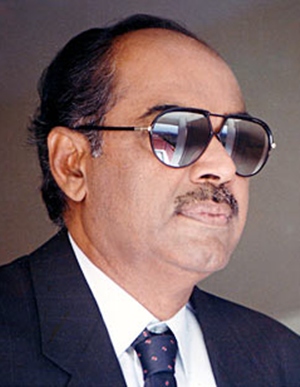
Daggubati Ramanaidu was an Indian film producer known for his work in Telugu cinema. He founded Suresh Productions in 1964 which became of one of the largest film production companies in India. He was one of the most influential movie Moguls in Indian cinema. He was placed in the Guinness Book of World Records for the most films produced by an individual, with more than 150 films in all official Indian languages. He also served as a Member of Parliament for the Bapatla constituency in Andhra Pradesh in the 13th Lok Sabha from 1999 to 2004.

Bhakta Potana is a 1943 Telugu-language biographical film directed by K. V. Reddy in his directorial debut. Based on the life of poet-saint Potana who translated Bhagavatham into Telugu language, the film was scripted by Samudrala Sr. The film had celebrated Jubilee runs all over the South India including Mysore state and Kerala. It was remade in 1966, starring Gummadi as Potana.
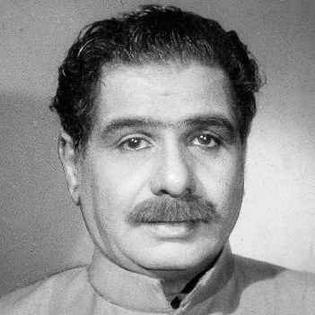
Vuppaladadiyam Nagayya Sarma, popularly known as Chittoor Nagayya, was an Indian actor, singer, music composer, and director known for his works in Telugu cinema, Tamil cinema, and Telugu theatre. Nagayya was one of the first multilingual filmmakers in India. Indian film journalist Baburao Patel described Nagayya as "The Paul Muni of India". Nagayya was considered the best character actor in South Indian cinema during 1940s and 1950s. In 1965, he became the first South Indian actor to receive the Padma Shri in Arts from the Government of India for his contributions to Indian cinema.
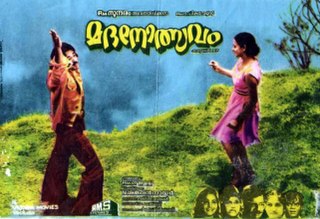
Madanolsavam is a 1978 Indian Malayalam-language romantic drama film written and directed by N. Sankaran Nair and starring Kamal Haasan, Jayan and Zarina Wahab. Dialogues and comedy scenes were written by Thoppil Bhasi. The film was partially remade in Telugu-language as Amara Prema by T. Rama Rao with Kamal and Zarina reprising their roles from the original. The film was dubbed into Tamil as Paruva Mazhai and into Hindi as Dil Ka Sathi Dil. The film is an unofficial remake of an English movie named Lovestory (1970).

Yaragudipati Varada Rao was an Indian director, producer, actor, screenwriter, and editor known for his works primarily in Telugu, Kannada, and Tamil films. Rao plunged into theatre and did a few stage plays before moving to Kolhapur and Bombay to act in silent films. Rao started his career as a lead actor in many silent films such as Gajendra Moksham (1923), Garuda Garvabhangam (1929), and Rose of Rajasthan (1931). Regarded as one of the greatest filmmaking pioneers of the Cinema of South India, he made motion-pictures across Telugu, Kannada, Tamil, Konkani, and Hindi languages, apart from silent films.

Saridey Varalakshmi was an Indian actress and singer who worked in Telugu and Tamil-language films. She was popular for her roles and songs in Telugu films like Sri Venkateswara Mahatyam (1960) and Mahamantri Timmarasu (1962) and Tamil films like Veerapandiya Kattabomman (1959) and in Poova Thalaiya (1969).

Padmini Ramachandran was an Indian actress and trained Bharatanatyam dancer, who acted in over 250 Indian films. She acted in Tamil, Hindi, Malayalam, Telugu and Russian language films. Padmini, with her elder sister Lalitha and her younger sister Ragini, were called the "Travancore sisters".
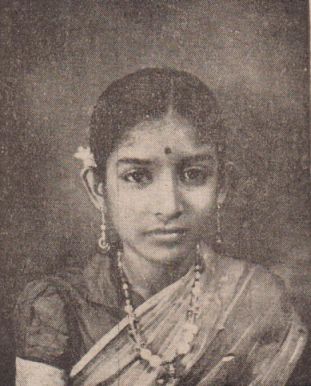
Pillavalu Gajapathy Krishnaveni, more famously known as Jikki, was an Indian playback singer from Andhra Pradesh. She sang around 10,000 songs in Telugu, Tamil, Kannada, Malayalam, Sinhalese, and Hindi languages.
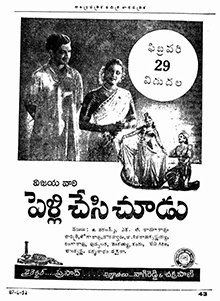
Pelli Chesi Choodu is a 1952 Indian satirical comedy film directed by L. V. Prasad and produced by Nagi Reddi and Chakrapani under their company Vijaya Productions. The film was made simultaneously in Telugu and Tamil, the latter titled Kalyanam Panni Paar. It stars N. T. Rama Rao, G. Varalakshmi, Yandamuri Joga Rao and Savitri. S. V. Ranga Rao, Sivarama Krishnayya, Doraswamy, and Suryakantham play supporting roles in the Telugu version while C. V. V. Panthulu replaced Krishnayya in Tamil.
Mudigonda Lingamurthy, shortly Lingamurthy, was an Indian film character actor known for his works in Telugu cinema and theater.
Bratuku Teruvu (transl. Livelihood) is a 1953 Telugu-language drama film, produced by Kovelamudi Bhaskar Rao under the Bhaskar Productions banner and directed by P. S. Ramakrishna Rao. It stars Akkineni Nageswara Rao and Savitri, with music composed by Ghantasala. The film was also dubbed in Tamil as Bale Raman (1956), remade in Kannada as Badukuva Daari (1966), in Hindi as Jeene Ki Raah (1969) and later in Tamil as Naan Yen Pirandhen (1972).

Chiranjeevulu (transl. Immortals) is a 1956 Indian Telugu-language romantic drama film, produced by D. L. Narayana under Vinoda Productions banner and directed by Vedantam Raghavayya. It is a partial remake of the Hindi film Mela (1948). The film stars N. T. Rama Rao and Jamuna, with music composed by Ghantasala. It was released on 15 August 1956 and became a commercial success.
Sozhavanthan Varadharajan Venkatraman, also known as SVV, was an Indian actor, singer, and music director, who was active in the Indian film industry from 1938 to the 1970s.

Thai Ullam is a 1952 Indian Tamil-language film directed by K. Ramnoth. Starring V. Nagayya, Manohar and R. Ganesh, the film has music composed by Nagayya and A. Rama Rao. It is an adaptation of the 1861 novel East Lynne, by Ellen Wood. The film was released on 9 February 1952, and emerged both a critical and commercial success.
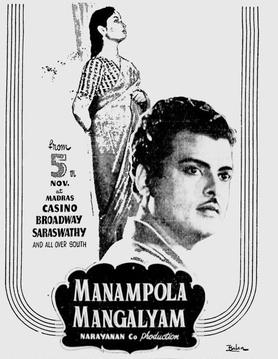
Manam Pola Mangalyam is a 1953 Indian Tamil language comedy film directed by P. Pullaiah. The film features Gemini Ganesan and Savithri in the lead roles. No print of the film is known to survive, making it a lost film.
Cuddalore Nagarathnam Pandurangan was a noted music director who had scored music for Tamil, Kannada, Telugu and Sinhala movies. C. N. Pandurangan was an Indian music director who worked mainly in South Indian films.
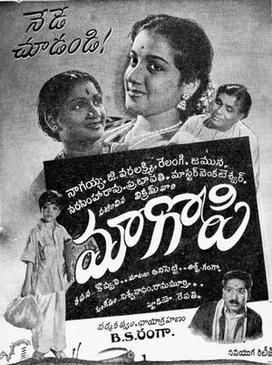
Maa Gopi is a 1954 Telugu language film directed by B. S. Ranga. The film stars V. Nagayya, G. Varalakshmi, Vallam Narasimha Rao, Jamuna.
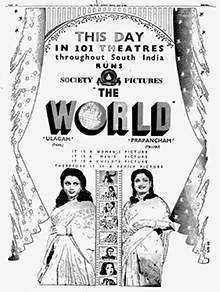
Ulagam is a 1953 Indian Tamil-language film directed by L. S. Ramachandran. The film stars V. Nagayya and M. V. Rajamma.

Paropakaram is a 1953 Indian Tamil-language film directed by Kamal Ghosh. The film stars Ramesh Sharma and Savithri.
Rechukka Pagatichukka is a 1959 Indian Telugu-language swashbuckler film, produced by N. Trivikrama Rao and directed by Kamalakara Kameswara Rao. It stars N. T. Rama Rao, Sowcar Janaki and S. V. Ranga Rao, with music composed by T. V. Raju. The film was simultaneously made in Tamil as Raja Sevai.
References
- ↑ "Naa Illu (1953)". Idlebrain.com . Archived from the original on 15 March 2010. Retrieved 12 March 2010.
- 1 2 3 4 Guy, Randor (23 January 2009). "En Veedu 1953". The Hindu . Archived from the original on 7 September 2012. Retrieved 14 January 2018.
- 1 2 3 Film News Anandan (23 October 2004). Sadhanaigal Padaitha Thamizh Thiraipada Varalaru [History of Landmark Tamil Films] (in Tamil). Chennai: Sivakami Publishers. Archived from the original on 14 January 2018.
- ↑ G. Neelamegam. Thiraikalanjiyam — Part 1 (in Tamil). Manivasagar Publishers, Chennai 108 (Ph:044 25361039). First edition December 2014. p. 50.
- Naati 101 Chitralu (Telugu hit films released between 1931–1965), S. V. Rama Rao, Kinnera Publications, Hyderabad, 2006, pages: 84-5.